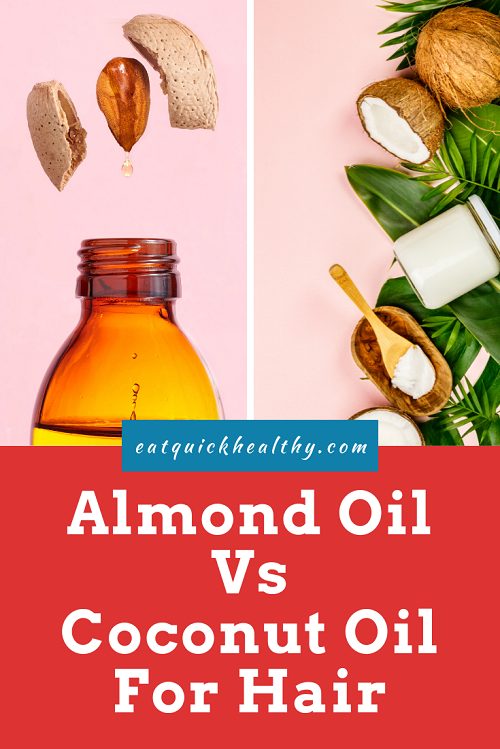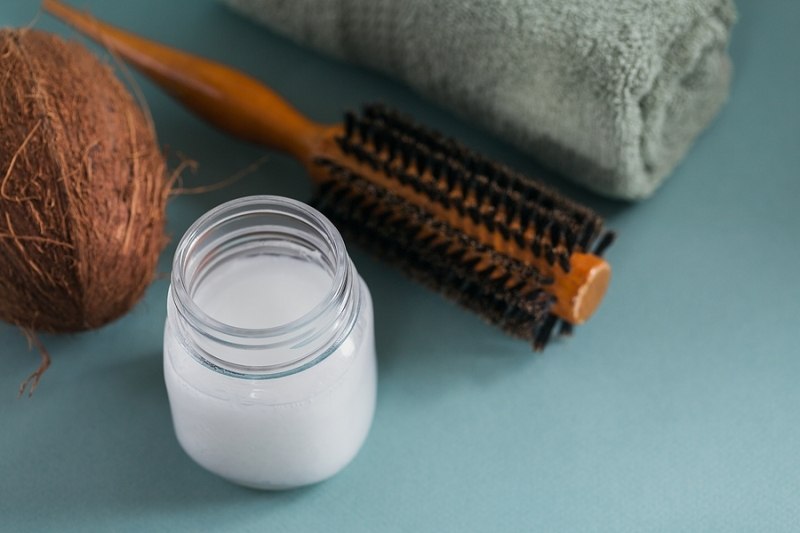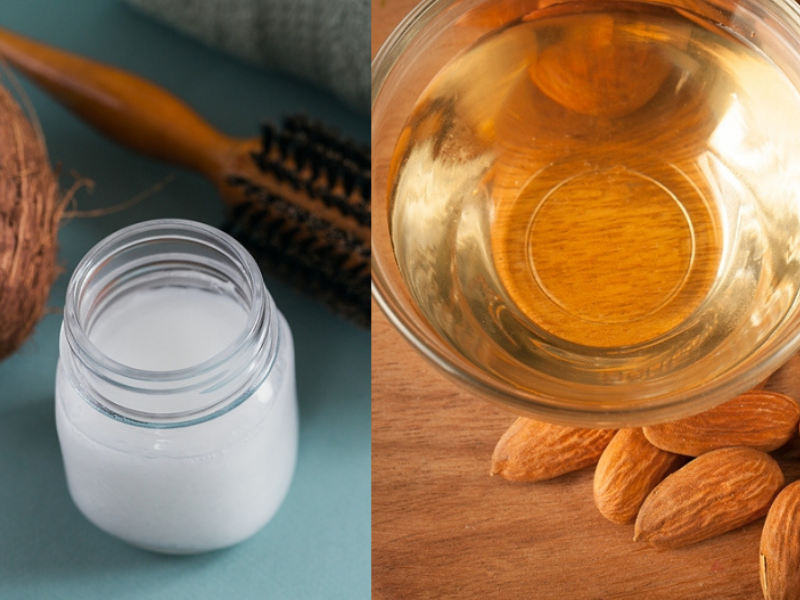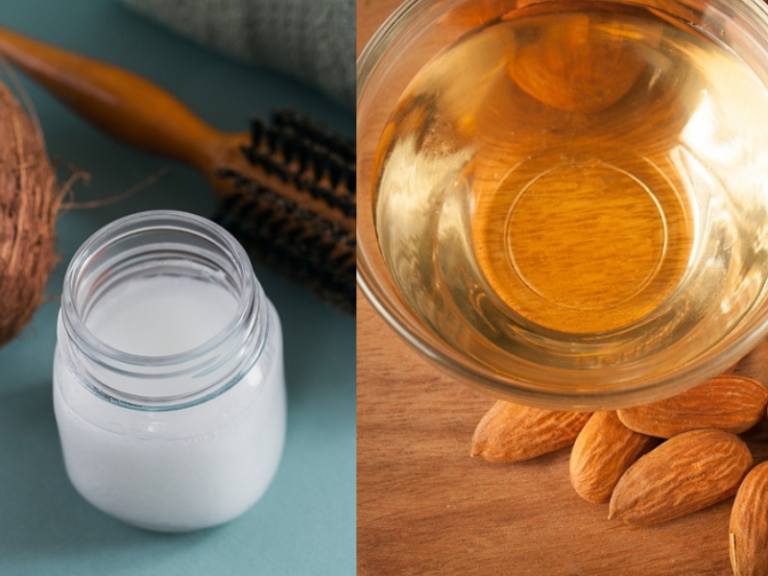Almond oil vs coconut oil for hair, have you wondered which is best? Or have you ever tried using these oils for your hair care?
Or perhaps you are looking for a new hair product that is all-natural, cheap, and easy to buy and use and has come across both sweet almond oil and coconut oil for hair and are wondering if almond oil or coconut oil is better for hair.
I too wondered all of this when I first started to fall in love with coconut oil and then almond oil. So I compiled this list of why you may want to use an oil like these in your hair as well as the benefits of each before comparing sweet almond oil vs coconut oil for hair.

This is based on lots of research as well as my personal experiences using both.
I also talk about mixing coconut oil and almond oil for hair – could this be the way to get the benefits of both? Or will your hair end up a mess?
Let’s find out!
Why Use Almond And Coconut Oil For Hair?
When I first came across the idea of using either almond or coconut oil for hair, it seemed a bit crazy to me. Why would I want to put oil in my hair?!
However, then I read more and tried it and realized it wasn’t crazy at all.
Both almond oil and coconut oil are full of nutrients and good things that can help your hair. From moisturizing your hair to protecting and nourishing your scalp and preventing split ends, there is a lot to love about both options.
In fact, there are so many good reasons to use either almond oil or coconut oil in your hair that it deserves its own section so I describe the main benefits of each below.
Either oil is worth using in your hair.
Benefits Of Using Almond Oil For Hair

There are many benefits to using almond oil in your hair thanks to all the nutrients it contains. They are described below.
Almond Oil Conditions Hair
The nutrients and omega-fatty acids in almond oil can help repair damaged hair and also add moisture to hair providing a deep conditioning treatment. It’s great for moisturizing in general and any problem parts.
Almond Oil Strengthens Your Hair
Nutrients such as vitamin B7 in almond oil help strengthen your hair. As stated above, it also conditions your hair. Well-moisturized and conditioned hair is stronger and less likely to break.
Almond Oil Softens Hair
Almond oil acts as an emollient on hair and skin which means it softens and smoothes. Over time, your hair can become a softer texture which is easier to style. You do need to use it consistently though.
This is due to the vitamin E in almond oil which fills tiny problem breaks in the hair
Almond Oil Can Smooth Frizzy Hair
Almond oil can be used as a leave-in conditioner to help calm frizzy hair. It helps seal in the moisture in hair leading to smoother strands and frizzy hair kept at bay.
Almond Oil Is Good For Your Scalp
Almond oil has antibacterial and antifungal properties that balance out yeast which can help prevent dandruff. It also cleanses the hair follicles and conditions the scalp.
Rubbing small amounts of almond oil into your scalp can increase blood flow and provide antioxidants to the scalp.
Almond Oil May Help Hair Growth
While there is no proof that almond oil can make hair grow, applying almond oil to your hair and scalp for all the reasons above will leave your hair in a great position to grow faster.
Since it helps make your hair stronger with less chance of breaking, at the very least your hair growth won’t be affected by hair loss due to damage.
Using Almond Oil In Your Hair
You can simply rub almond oil directly in your hair. Rub it into the scalp for the scalp benefits mentioned here and into the ends to help increase shine and softness.
It’s not recommended to put almond oil on your hair before drying or using other heating apparatus.
Benefits Of Using Coconut Oil For Hair

Like almond oil, coconut oil has many benefits for your hair. Below, I describe the main ones.
Coconut Oil Moisturizes Hair
Coconut oil is full of nutrients and lauric acid which can nourish and moisturize your hair. It can absorb quickly into hair helping mend any breaks and minimizing frizz.
Its quick absorption and moisturizing abilities can make it extra good for dry hair.
Coconut oil will also nourish and moisturize your scalp helping to keep your hair healthy as well.
Coconut Oil Helps Prevent Split Ends
The fact that coconut oil can absorb hair fast (and also does it well according to this study which found it makes its way deep into the hair shaft) means it can help prevent split ends and hair breaks.
The study mentioned before also found that coconut oil helps prevent protein loss in hair. Protein loss can lead to dry and brittle hair which breaks so coconut oil helps to prevent this.
Coconut Oil Protects Hair From Heat Damage
Using coconut oil as a leave-in conditioner before drying or in hot weather can help protect hair from heat damage. It naturally creates a barrier on your hair to protect it.
Coconut Oil Can Be Used As Shampoo
If you are looking for a natural alternative to shampoo with zero additives, coconut oil is an option. This can be especially useful for babies and kids with sensitive skin.
Only use a small amount and make sure you wash it from your hair or it can seem greasy.
Coconut Oil Fights Fungal Infections
Coconut oil has been found to help with some types of fungal infections. Rubbing it into your scalp can help with this and other problems, including possibly helping with dandruff.
Using Coconut Oil In Your Hair
Coconut oil is best applied either pre-shampoo (and then washed off), as part of your conditioning treatment (you can add some to your conditioner), or as a leave-in conditioner.
It is easier to use if you melt it first – you can do this in the microwave or, for small amounts, you can rub it in your hands to melt it.
Be careful about using too much – it can clog up your hair and scalp. It can look greasy in your hair if you have too much. A little goes a long way.
Almond Oil Vs Coconut Oil For Hair – Who’s The Winner?

So both almond oil and coconut oil are good for hair. It’s possible you can even use almond oil and coconut oil for hair growth.
But when it’s coconut oil vs almond oil, who wins?!
In part, the winner depends on what you want from the hair product you buy.
Here’s a summary of the benefits of almond oil and coconut oil for hair:
| Almond Oil | Coconut Oil |
| Good hair conditioner | Good hair moisturizer |
| Strengthens hair | Prevents split ends |
| Softens hair | Protects from heat damage |
| Smoothes frizzy hair | Can be used as shampoo |
| Good for scalp | Fights fungal infections |
| Helps hair growth |
So is almond oil better than coconut oil for hair?
Overall, almond oil is the winner in my opinion. It slightly edges out coconut oil in its list of benefits.
In my personal experience, I also prefer almond oil. It’s easier to apply since it’s liquid at room temperature and it doesn’t have as strong a smell. It feels less greasy and heavy in my hair and scalp and I think it leads to better results.
So I’m awarding almond oil the winner in the coconut vs almond oil for hair debate.
You can buy
Should I Use Almond Oil And Coconut Oil Mixture For Hair?

So both coconut and almond oil for hair sound great. Can I mix almond oil with coconut oil? Can I get the benefits of both of them if I mix almond oil with coconut oil for hair application?
Yes, you can use almond oil mixed with coconut oil for hair. There is nothing stopping you as long as you like how it feels and interacts with your hair.
A way you can get the benefits of both is with a coconut oil and almond oil hair mask. An easy hair mask recipe is the following:
- Whisk an egg in a bowl
- Add 2 tablespoons of coconut oil (melted), 1 tablespoon of almond oil, and 1 tablespoon of honey
- Whisk until well combined
- Apply to your hair starting at the roots and working your way to the tips
- Cover in a shower cap and leave for 30 minutes
- Rinse and wash as normal
If you are wondering if almond oil and coconut oil for beard growth works, it’s the same as the findings for hair growth. There is no proof it will help it grow your beard, but using either option on your beard will help strengthen and prevent split ends and breakage which help provide the optimal conditions for growth.
FAQs
Is almond oil or coconut oil better for dry hair?
Both almond oil and coconut oil are beneficial for dry hair. Almond oil’s moisturizing properties can help hydrate and soften the hair, while coconut oil’s fatty acids provide deep hydration and nourishment. The choice depends on personal preference and hair type.
Can almond oil or coconut oil be used for scalp conditions?
Almond oil and coconut oil both have soothing properties that can help alleviate scalp dryness and itchiness. They can be gently massaged into the scalp to moisturize and nourish the skin. It’s essential to consult a dermatologist for severe or persistent scalp conditions.
Can almond oil or coconut oil be used on all hair types?
Both almond oil and coconut oil are generally suitable for all hair types. However, individuals with fine or thin hair may find that coconut oil weighs their hair down. Test a small amount on your hair to see how it responds before incorporating it into your routine.
Conclusion
I hope you found this guide to almond vs coconut oil for hair useful and that it answers all your questions to which to use as well as the benefits of using either almond or coconut oil.
For more information about using almond oil on your skin click here, almond oil on your face here, almond oil on your beard here or almond oil on your eyelashes here. You can also find all our guides to coconut products here and almond products here.



Comments are closed.